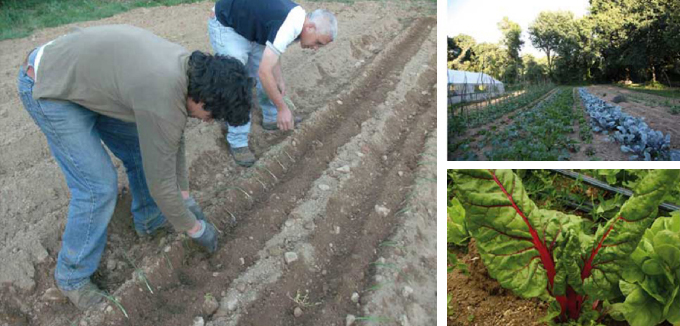One example of integrated production: DAIQUI (“from here”)
3. September, 2013
Contributor: Ourense City Council
“From the land to the home” is possible in Ourense perimeter
Concept
They are a group of farmers with ecological sensibility organized to farm fresh and healthy food under Eco agriculture principles.
This group is located on a little village called Rairiz on the south of Ourense. This village is one of couple of lands didn´t develop “land replotting” on 80s for ecologists victory.
Daiquí is a rural sustainable Project since 1996 with ecologic activists as partners to demonstrate galician traditional system is a big worth. This system well-adjusted can develop all functions what one country needs from its land
DAQUI objectives:
- Preserving traditional agriculture and its landscape.
- Stopping rural withdrawal, creating employment.
- Pushing up the value of farmer jobs linked their social add-value.
- Preserving and empowering native seeds
- Supporting ‘preservation of natural resources: Water, Land and Air
Results
DAIQUI is a cooperative with five partners-workers focused to producing all kind of ecologic food.
They have a bio-built storehouse where they prepare all food requests and send to end-customers directly on their home in Ourense city and other villages of province council (Ourense Province as O Carballiño e Xinzo).They send to rest of Galicia and Spain by cooled post.
They have lands and greenhouses where farm vegetables and fruits. Their added value is all food is harvest the same day of request.
All workers and collaborators are under monitoring of Consello Regulador de Agricultura Ecolóxica de Galicia. (Regulation Agency of Ecologic agriculture on region)
When product´s demand is out of season the cooperative has a networking of farmers on all Galicia, rest of Spain and Portugal. This is the way to have a varied and constant offer of Eco food basics.
When they are preparing their customer orders DAIQUI reduces waste production to limit using wood and carton boxes, paper bags or biodegradable plastics. All organic waste are composted
Within their goal of varied and constant offer they are including packing food as oil, canned food and pasta.
Benefits
Environmental:
- Eco food production without wastes.
- Conservation of traditional systems
Social:
- Valued traditional ways of agriculture.
- Change of pejorative vision of agriculture jobs as productive workers and landscape and health keepers.
Pro and Contra
- Strong points:
- Strictly ecologic production
- Jobs on agriculture
- Culture exchange between traditional knowledge and new methods.
What are the lessons learn to be used/transferred/implemented in the other partner cities?
Integrated Agriculture with Cooperative Method is possible
Formulate a question to the network:
Has your city any rururban private initiative in this way?
